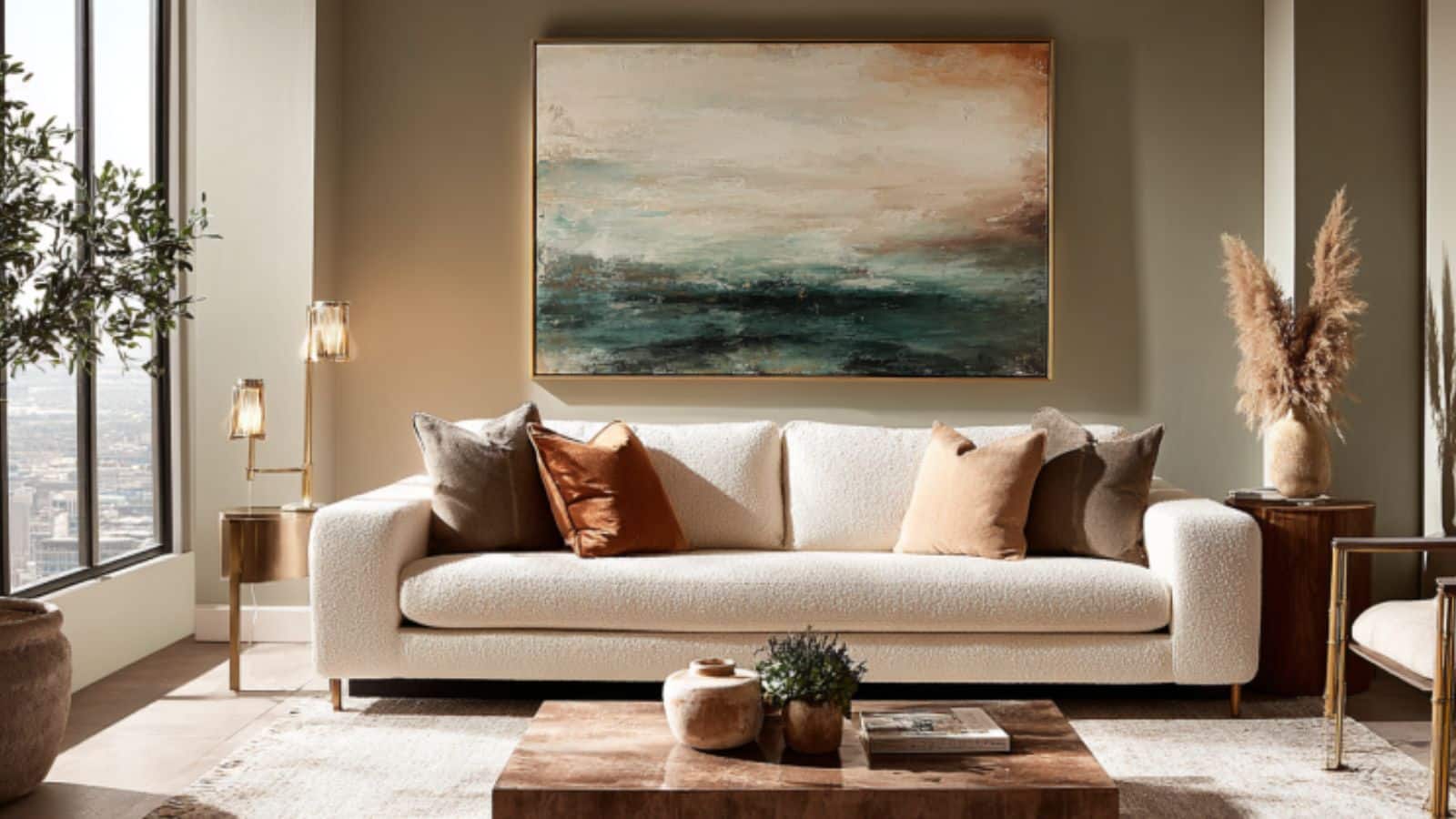Effortless Large Wall Decor Living Room Styling Tips for a Stunning Interior
Table of Contents
A large, blank wall in your living room can be both a design opportunity and a decorating dilemma. On one hand, it offers a clean canvas with unlimited potential; on the other, filling that space without overwhelming the room requires a delicate balance of creativity, proportion, and personality. According to a recent survey by Houzz, over 70% of homeowners say they feel “stuck” when styling expansive wall spaces—especially in open-concept living rooms where every decor choice has a ripple effect.
Whether you’ve just moved in or you’re looking to refresh your space, mastering large wall decor in the living room can instantly transform your interior from basic to beautifully curated. From oversized artwork and sculptural elements to gallery walls and textural layering, there are countless ways to bring style and warmth to your vertical real estate.
In this post, we’ll explore practical, elegant, and effortlessly stylish ideas for decorating large living room walls. You’ll learn how to choose the right pieces, understand scale and symmetry, play with different materials, and layer in personality without overcrowding. Whether your home leans modern, traditional, minimalist, or eclectic, these styling tips will help you make a statement—gracefully.
Choosing the Right Scale for Impact and Balance
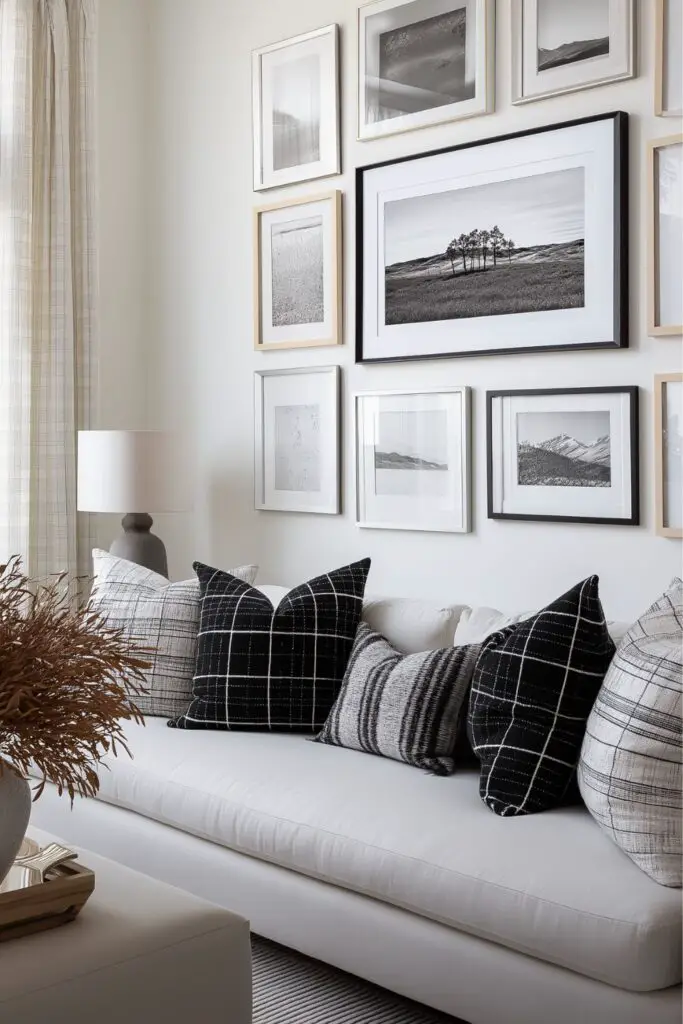
When it comes to styling large walls in the living room, scale is everything. Too small, and your art or decor will look lost. Too large, and it might overwhelm the space. The key is finding a balance that fills the wall without overpowering the rest of your room’s design.
Start by measuring your available wall space. A good rule of thumb is to fill about two-thirds to three-quarters of the wall with decor. If you’re styling above a piece of furniture like a sofa or console table, aim for your artwork or arrangement to be roughly the same width (or slightly smaller) than the furniture below. This creates a grounded, cohesive look.
For particularly expansive walls, consider one large statement piece—like an oversized painting or a framed textile—that becomes a bold focal point. Alternatively, opt for a symmetrical grid of smaller pieces for a modern, structured feel. The larger the wall, the more flexibility you have in how you fill it—just be sure to maintain proportion relative to the room’s furnishings and ceiling height.
Also consider vertical scale. Tall pieces help emphasize ceiling height, while wider arrangements elongate horizontal spaces and balance long sofas or media centers.
Wall Decor Scale Guide
| Wall Size | Ideal Decor Approach | Style Tip |
|---|---|---|
| Small-to-Medium Wall | One medium piece or two small frames | Keep it simple and centered |
| Full Wall Behind Sofa | One large horizontal piece or 3–5 smaller | Align bottom edge 6–8″ above furniture |
| Tall/Open Wall Space | Tall mirrors, vertical art panels | Accentuate height and openness |
| Gallery-Ready Wall | Symmetrical grid or cohesive collection | Use consistent frame size and spacing |
Creating a Balanced Gallery Wall Without Clutter
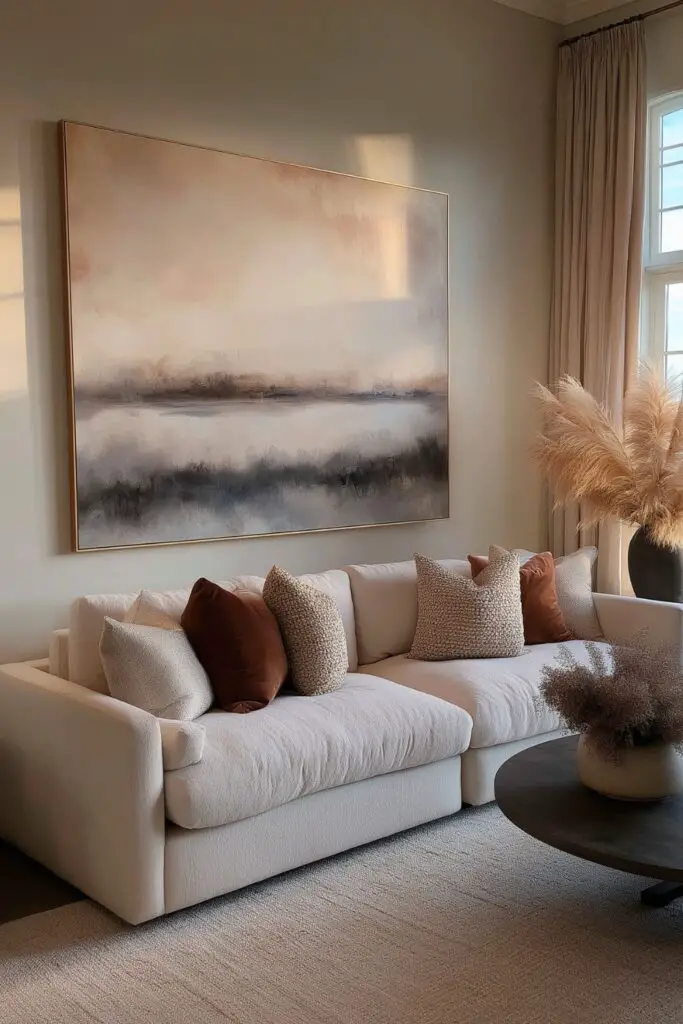
Gallery walls are a timeless way to fill large walls with personality, but when not done thoughtfully, they can quickly feel chaotic. The trick is maintaining cohesion while showcasing variety—think of it as an intentional collage rather than a random collection.
Begin by selecting a color palette or theme. Whether it’s black-and-white photography, botanical prints, vintage maps, or family portraits, visual consistency ties everything together. Stick with similar frame colors or matting to unify the layout, even if the content varies.
Layout planning is essential. Before hammering nails, arrange your pieces on the floor and photograph potential layouts. Symmetrical grid-style galleries bring order, while salon-style walls offer more creativity with varied sizes and shapes. Always start by anchoring with your largest piece and build outward from there.
Spacing matters just as much as the content. Aim for 2–3 inches between frames to allow breathing room. In a smaller living room, limit the gallery to one wall to avoid visual overcrowding.
Gallery Wall Checklist
| Step | Key Tip |
|---|---|
| Select a Theme | Choose related subjects or a color scheme |
| Plan the Layout | Test on the floor or use paper cutouts |
| Anchor the Arrangement | Start with the biggest piece in the center |
| Maintain Consistent Gaps | Use a ruler or level for 2–3″ between pieces |
| Keep it Scaled | Fit the wall without overwhelming space |
Incorporating Mirrors to Reflect Light and Add Depth
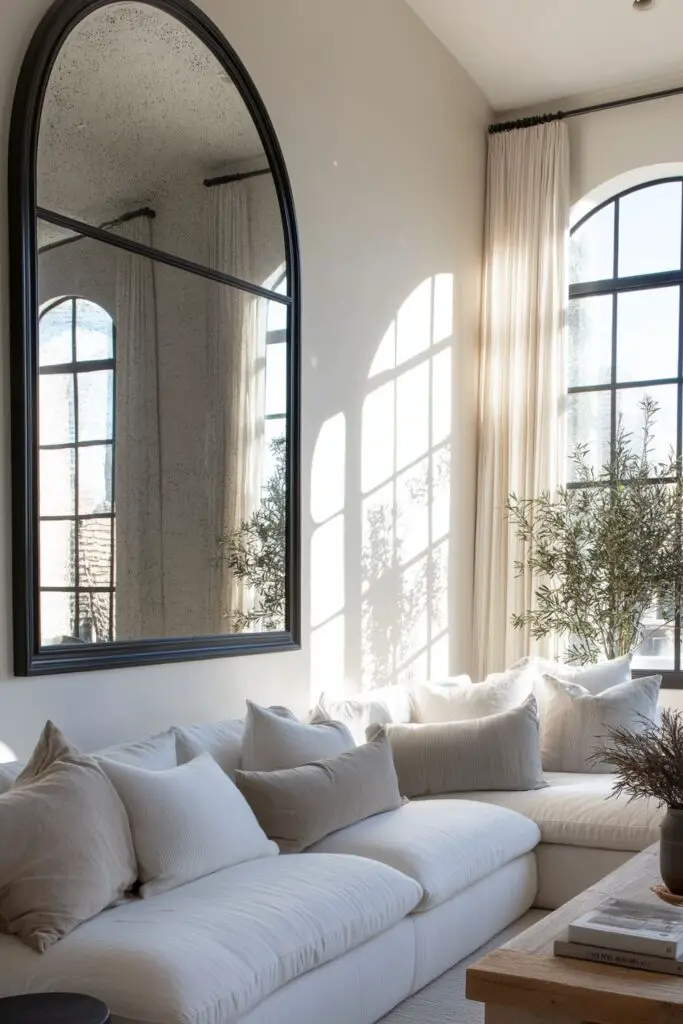
Mirrors are a powerful design element—especially in living rooms with large, bare walls. Not only do they add visual interest, but they reflect natural light, expand the sense of space, and double as sculptural decor.
A single oversized mirror can act as a dramatic focal point. Leaning a full-length mirror against the wall brings elegance and height, while hanging a round or arched mirror above a console or fireplace softens the room’s lines. For even more dimension, opt for antique or tinted glass finishes that blend seamlessly into moody or traditional interiors.
If you’re working with multiple mirrors, maintain cohesion by choosing a unified material—like gold, matte black, or wood—and consider spacing and height to avoid visual noise. Be mindful of what the mirror reflects. Placing it opposite a window or light source enhances brightness, while facing it toward art or greenery creates an elevated reflection.
Mirror Placement Ideas
| Mirror Type | Best Location | Styling Impact |
|---|---|---|
| Oversized Leaning Mirror | Corner or behind accent chair | Adds height and elegance |
| Round Wall Mirror | Above console or fireplace | Softens space, balances rectangular lines |
| Paneled Mirror Grouping | Symmetrical wall layout | Adds architectural detail |
| Framed Antique Mirror | Near entryway or lounge area | Enhances character and warmth |
Mixing Materials and Textures for Depth
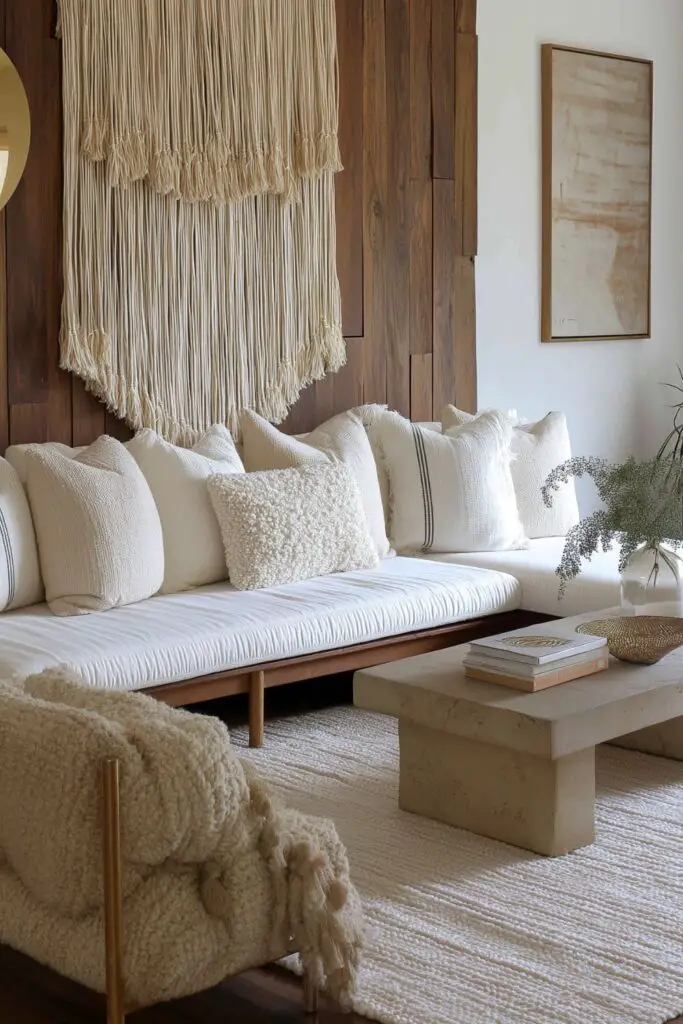
A truly effortless and sophisticated wall decor scheme isn’t just about what you hang—it’s also about how different textures and materials play together on a large canvas. Mixing materials adds visual interest, breaks up monotony, and makes the space feel more dynamic and lived-in.
Start by incorporating a variety of finishes. Combine wood-framed art with metal sculptures, soft textile wall hangings with sleek mirrors, or raw ceramics with smooth glass shelves. This contrast in texture adds dimension and makes even a monochrome palette feel layered and thoughtful.
Fabric-based pieces like macramé, woven tapestries, or framed textiles offer a tactile softness that balances harder surfaces like metal or stone. These are especially helpful in creating a cozy, boho-inspired feel. Wood elements—such as carved panels or reclaimed planks—add warmth and a natural element that pairs beautifully with modern decor.
For a minimalist approach, stick with a restrained color scheme but vary materials. For example, a white canvas painting, a pale wood shelf, and a brass-framed mirror can all live together harmoniously when their tones echo one another.
The key is balance. Avoid placing all the heavier elements (like wood or metal) in one section of the wall. Spread materials evenly and let your eye flow naturally from one texture to the next.
Material Mixing Inspiration Table
| Material | Visual Effect | Pairing Suggestion |
|---|---|---|
| Woven Textiles | Soft, organic, grounding | Pair with brass or matte black |
| Reclaimed Wood | Warm, rustic, earthy | Combine with modern prints or stone accents |
| Metal Accents | Sleek, structured, reflective | Contrast with natural or fabric textures |
| Canvas or Linen Art | Matte, neutral, subtle | Blends well with mirrors or wood |
| Ceramic Wall Objects | Handcrafted, sculptural | Adds depth to contemporary layouts |
Using Shelves for Functional and Stylish Display
Wall-mounted shelves are not only practical but also offer a versatile way to style large wall space with evolving personality. Whether you’re showcasing books, ceramics, framed prints, or plants, shelves allow for changeable decor with depth and charm.
Opt for floating shelves to maintain a sleek, modern look. For more traditional or rustic styles, use bracketed wood shelves with visible supports. Vary shelf heights and lengths for visual interest, and stagger them vertically to avoid overly linear layouts.
Styling shelves is an art in itself. Think in layers—lean a piece of framed art behind smaller objects, group items in threes for balance, and alternate between decorative and functional pieces. Don’t overcrowd the space; leaving negative space makes each item stand out more.
Integrated lighting can elevate the shelf styling. Add small LED spotlights or a backlit edge to create ambiance, especially for evening settings.
Shelf Styling Table
| Shelf Style | Best For | Decor Ideas |
|---|---|---|
| Floating Wood Shelf | Minimal, Scandinavian, modern | Books, ceramics, plants, art |
| Metal Frame Shelf | Industrial, eclectic | Glass decor, vintage finds |
| Asymmetrical Layout | Artistic, casual | Layered books, candles, mixed materials |
| Picture Ledge | Swappable art display | Rotating framed prints and typography |
Conclusion
Styling large wall decor in your living room doesn’t have to feel overwhelming. By understanding scale, playing with texture, layering different materials, and curating a thoughtful mix of pieces, you can turn a once-blank wall into a striking, comfortable, and personalized focal point. Whether you gravitate toward oversized artwork, textured hangings, gallery collections, or sculptural mirrors, the key is balance—letting each piece speak while supporting the overall tone of the room.
A well-styled wall has the power to anchor your entire living space. With these effortless tips and practical approaches, your living room can become a reflection of both comfort and creativity—an environment that welcomes and inspires with every glance.

